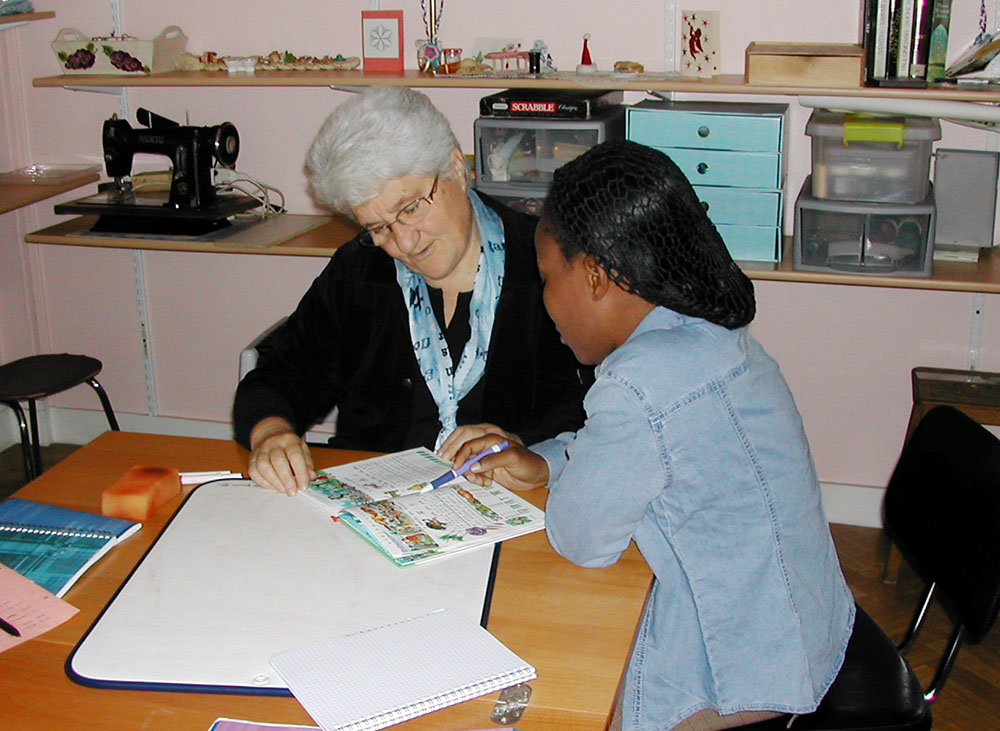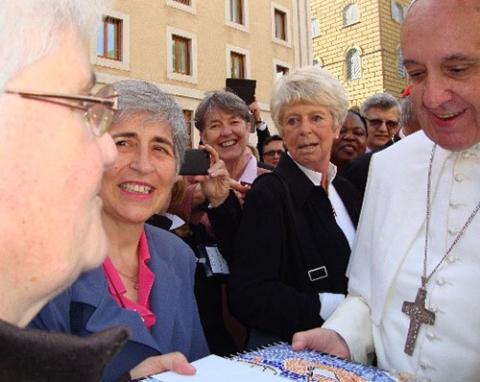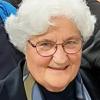
Good Shepherd Sr. Marie-Hélène Halligon, left, teaches the French language to a survivor of trafficking. (Courtesy of Marie-Hélène Halligon)
Soon after his election in 2013, Pope Francis held his first workshop on human trafficking, and I went to the Vatican to take part in it. Before I left Paris, I asked the "survivors" living in our shelter what message I should give to the Holy Father on their behalf.
They didn't give me an envelope with a written message, but a mosaic depicting an empty boat in front of a lighthouse. It represented the island of Lampedusa, one of the primary points of European entry for many migrants. It weighed heavily in my bag!
On the first day of the workshop, we had the joy of meeting Francis. Gathering all my courage, I presented the mosaic to him and explained who had made it.

Good Shepherd Sr. Marie-Hélène Halligon, left, presents the Lampedusa mosaic to Pope Francis. (Courtesy of Marie-Hélène Halligon)
I took photos of the encounter back to the shelter to share with the residents. After that, the young woman who had made the mosaic was baptized and had her son baptized.
I am a sister in the Congregation of Our Lady of Charity of the Good Shepherd. The organization of our congregation into provinces had kept us more focused on the national level. But as part of a "European Circle of Sisters in Apostolic Situations," we had been meeting regularly to see how we could work together on the European level.
During one of these meetings, maybe in 1994, we read a newspaper article that said 500,000 women from Eastern Europe were victims of trafficking in Western Europe. As Good Shepherd Sisters, dedicated to the service of vulnerable women, we could not ignore that information!
We reported to the council of our congregation that we wanted to make trafficking the topic of our next meetings, but it had not been among the priorities of the previous General Chapter. Not discouraged, we continued insisting — and the next General Chapter made the fight against trafficking its first priority!
One of the sisters of the province had been called to be part of a European group that was being formed — under the aegis of the Union of International Superiors General (UISG) and under the leadership of Consolata Sr. Eugenia Bonetti. But soon, that Good Shepherd sister was elected provincial, and asked me to replace her for this mission.
I eagerly accepted, in light of what we had discovered, and we began going every year, since the European Circle (already present in 13 countries) met yearly in a different country each time.
At the same time, I was asked to join the "Collective Against the Trafficking of Human Beings," an organization set up by Secours Catholique-Caritas France; I am still working with this group.
This group of 27 associations and my congregation lobbies the government, along with a government organization created in 2012 to fight human trafficking and violence against women, the MIPROF (Inter-ministerial Mission for the Protection of Women Victims of Violence and the Fight Against Trafficking in Human Beings). We also cooperate with the GRETA (Group of Experts against Trafficking) of the Council of Europe, especially when GRETA takes stock with France on the national situation, and we provide a report on the situation.
All this was put on the back burner for me when I became provincial councilor and bursar from 2002 to 2008.
In 2009, the RENATE network (Religious in Europe Networking Against Trafficking and Exploitation) was founded, to put the European network under the "umbrella" of the UISG and give it an official standing. I was a co-founder, or trustee (we are a foundation in the Netherlands) and was part of the "Core Group" for nine years.
My role is to lead the spiritual animation group, since RENATE is faith-based. Our site has a House of Prayer, and prayer for and with survivors is important and inclusive — even contemplative or elderly sisters can join us in prayer.
At meetings, the day begins with a prayer; I use PowerPoint, which is easier to understand, since all the work takes place in English. We have daily Eucharist and an annual retreat for groups of about 10.
In 2008, I went back to Paris, continuing my ministry there, and later to Strasbourg, to continue the commitments against trafficking.
Later, RENATE participated in a conference of international nongovernmental organizations (INGOs) in Romania, as a member of ANDANTE (an association of Catholic women accredited with the Council of Europe.)
At this conference, I was asked to prepare the accreditation file for our network, so RENATE has been accredited since Aug. 28, 2018. Since then, I have been the representative of RENATE at the Conference of INGOs, and participate in the annual sessions. I am a member of three working groups: Environment, Social Cohesion and Territories; Poverty; and Migration Watch Unit.
Advertisement
I committed myself to being the voice of victims of trafficking heard at the Council of Europe, which is not easy: You must manage to make the voice of your organization heard amid the many human rights issues. Thanks to what I had learned on the Migration Watch Unit, I was able to intervene during a videoconference session on trafficking in times of pandemic.
The possibilities are opening up for 2021. Since trafficking of human beings is included in the Council of Europe's programs, RENATE will therefore be able to participate fully for the cause of so many victims. We are also preparing the RENATE general assembly in November in Fatima, Portugal; the discernment process to elect a new president will begin soon.
Other memorable events for me have been:
- When I lived in Paris, I hosted some young refugees, one of whom keeps in touch and tells me about her marriage and job. I also volunteered to give French lessons in a shelter for survivors of sexual exploitation.
- With the Collective Against Trafficking, we initiated a "thematic" year on trafficking with a high school in Strasbourg. They presented their work to the Council of Europe: panels, posters, videos and models, for which they were recognized by the council.
- I did an awareness day for the sisters and laypeople of two religious communities in Metz.
- Here in Strasbourg, we welcome families of refugees or survivors of prostitution, but during the lockdown, we had to curtail our activities, since at our age, we are "people at risk"!
- I have written three letters to Francis begging him to ask all believers to say an "Our Father" every day against trafficking — to end our indifference, to free traffickers from their greed and vision of people as only profitable merchandise.
Our foundress, St. Mary Euphrasia Pelletier, is said to have observed in the 1850s, "A child of God, sold on the market like a goat, I will never accept that!"
I do not need to ask myself if my mission reflects the charism of the congregation, because it seems like we are, alas, still at the same point in 2021. But Jesus promised us: He is with us until the end of the world!





